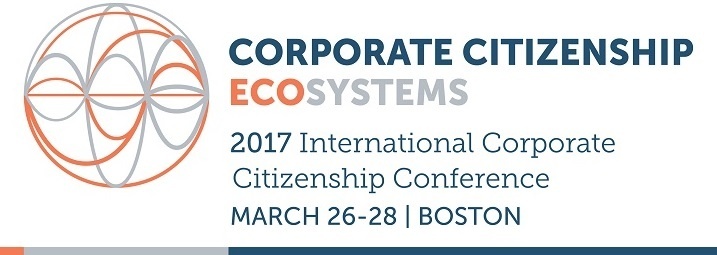In the more than three decades since the Boston College Center for Corporate Citizenship was founded, so much in our field has changed. Corporate citizenship has gone from a sideline effort of a few well-meaning companies to a strategic business imperative deemed vital by the majority of executives. Why has this shift occurred? Because business leaders have come to recognize that corporate citizenship delivers business AND social value—and that both of these are crucial to achieving sustainable growth.
In the last three decades, the role of a corporate citizenship professional has evolved. While many still operate in small teams, you have become experts at drawing on the ideas and information, expertise, effort, and financial support of your internal and external partners to advance your businesses, your communities, and our world.

These networks are part of your broader ecosystem. The paths our companies chart toward the future are shaped by the social, environmental, political, and economic pressures we experience daily from a complex system of local and global actors.
The ecosystems in which we operate create constraints and offer opportunities—coming from multiple directions and always in flux. These ecosystems will be the focus of our 2017 International Corporate Citizenship Conference, held in Boston on March 26-28.
Being aware of your corporate citizenship ecosystem is critical, not only for the success of your corporate citizenship programs, or the continued prosperity of your firm, but also in our collective efforts to solve some of the world’s most pressing challenges. Climate change, non-communicable disease, and access to education can’t be addressed by a single program, a single company—or even a single country.
During last year’s Conference, State Street sponsored a session with astronaut, aquanaut, and social entrepreneur, Ron Garan. Garan spoke of the orbital perspective that he developed while in space, and how it influenced the way he came to perceive the challenges that are facing our planet and what we all can do to overcome them. He pointed to collaboration as the key to putting the orbital perspective into action.
“Open, transparent collaboration can fuel tremendous economic growth,” he said. “We need to realize that any one of us or any one organization will not have all the pieces of the puzzle. However, if we do come together, we can make life on our planet as beautiful as it looks in space.”
Our corporate citizenship ecosystems are interdependent. A decision to invest in environmentally-friendly packaging, for example, doesn’t just increase interest among your more eco-friendly consumers. It inspires and engages your employees to seek innovative solutions. It spurs interest from socially responsible investors and signals to traditional investors that your company is forward-thinking and dedicated to risk management. It drives business to inventive suppliers, which may be located in your community or across your globe. And of course, it reduces your consumption of increasingly scarce environmental resources, preserving our planet and stabilizing our economy for years to come.
During our 2017 International Corporate Citizenship Conference, we’ll gather more than 600 CSR experts from around the world together in Boston to help you navigate your ecosystems, to help us all connect to new ideas and learn about evolutions in our corporate citizenship ecosystem. This 2.5 day event is sponsored by State Street, a company with more than 200 years of experience in advancing stable and prosperous communities.
Not a member? Learn more about how the Boston College Center for Corporate Citizenship can help you get the most from your programs by calling 617 552 4545 or emailing ccc@bc.edu.